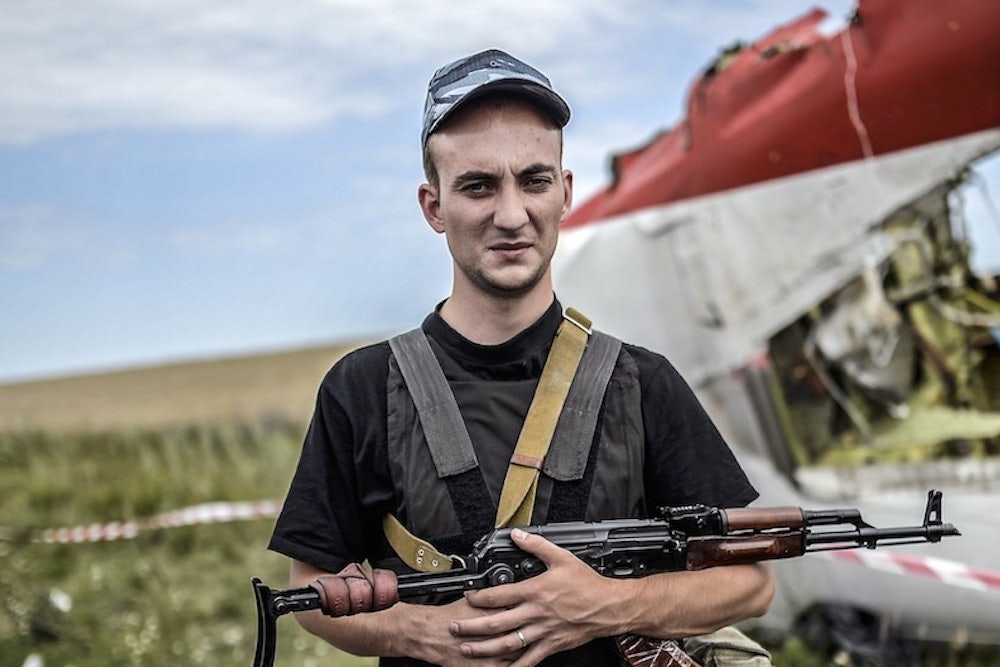If, after the crash of Malaysia Airlines Flight 17, you tried following Russia’s state-owned television and Russian-language internet updates simultaneously, you’d have encountered two contradictory and completely opposite streams of information. Russia’s state-owned TV channels (which have backed Donetsk separatists since March) have alternated between blaming Ukraine (a common scapegoat on the Russian TV) for the crash and denying that Russia or the separatists had any engagement in the accident: “Ukrainians hit the plane by mistake,” “Ukrainians targeted Putin’s plane,” “Ukrainian dispatchers led the plane into the conflict zone on purpose,” “Ukrainians confused the plane with a UFO or a spying plane,” etc. Julia Ioffe provides a more detailed account of this. Most independent web publications, on the other hand, have blamed the separatists, pointing at the overwhelming evidence that they are responsible for the crash.
One might hope that this tragedy would finally diminish Russians’ near-universal support for Donetsk separatists and Putin’s actions. But when you break down the various elements contributing to support for Putin, you begin to understand just how unlikely that outcome is. This year, approval of Putin hit its highest point in 14 years (almost 30 percent above its 2013 level). Putin’s approval consists of two large population segments: the so-called “core” support group that has made up roughly 30-40 percent of the population for most of Putin’s presidency; and the swing group that constitutes about 40-50 percent of the population and shifts preferences, depending on what they see on television.
The first, “core” support group has stickier preferences shaped by Russia’s political culture. This group is more likely to believe in a “strong man” who is just and fair, rather than in a democratically elected ruler accountable to voters. The post-imperial syndrome—a dream of a strong state uniting different cultures—plays an important role within this group. In a 2007 article, Yegor Gaidar explains why the blossoming of Russia’s post-imperial syndrome took place in the 2000s and not in the 1990s. During the “dashing nineties” (a term also coined by Russian TV propaganda), Russians were concerned with their own survival and didn’t have time to rethink the history of their country. When the long-awaited stability finally came, the legend of a prosperous powerful nation ruined by enemy-aliens was revived.
People’s consciousness functions in a particular way: Having chosen one worldview, they are disinclined to change it, since challenging their position becomes a challenge to their entire way of being. Many experiments indicate that people register new information only when it doesn’t threaten their political views or integrity of worldview. It's a mind trap: We struggle to abandon even the false ideas that underlie our worldview. Hence, the “core” support group of Russians will probably keep supporting Putin and will probably keep believing that the plane crash was an American conspiracy to provoke war with Russia.
The opinion of the swing group is mostly shaped by the state-owned media, which translates Kremlin propaganda 24 hours a day. (A week ago, Russia’s Pervyi TV channel took it to an extreme when they broadcast the story of a Slavyansk boy who was allegedly crucified by the Ukrainian army on an announcement board.) In their book, Prisoners of Power, Arkady and Boris Strugatsky described this phenomenon, where rulers employ mind-controlling broadcasts that suppress people’s ability to evaluate information critically.
The fact that the values and preferences of 40-50 percent of the population get so easily manipulated by the authorities, means that the concept of “public opinion”—as a derivative of a mature civil society—is largely not applicable in Russia. In late February, following the accession of Crimea, 58 percent of Russians supported the deployment of troops in Ukraine. But according to a recent survey conducted by the Levada Center, only 40 percent supported troops deployment in late June. The almost 20 percent decline is a consequence of the mild softening in the TV rhetoric regarding Ukraine in the last months. (Ukrainians are now portrayed as slightly less aggressive and slightly less Nazi than before.) The data also illustrates the short memory of this swing group: they forget the next day what they believed the day before. However, the plane crash catastrophe and any additional catastrophes won’t alter the majority viewpoint as long as TV channels remain under Kremlin control. And the Kremlin is extremely sensitive to this issue: It recently banned from operating on cable a TV channel, “Dozhd”, which had gained popularity for criticizing the regime.
Julia Ioffe cites Russia’s pro-Kremin analyst Gleb Pavlovsky, who warns that Putin has fallen into his own trap and will have to keep increasing the scale of his propaganda. In fact, the flexibility of preferences within the swing group means that a change of opinion is possible—if a different type of information is communicated to them through mass media. But, unfortunately, in the current climate, that seems very unlikely.
